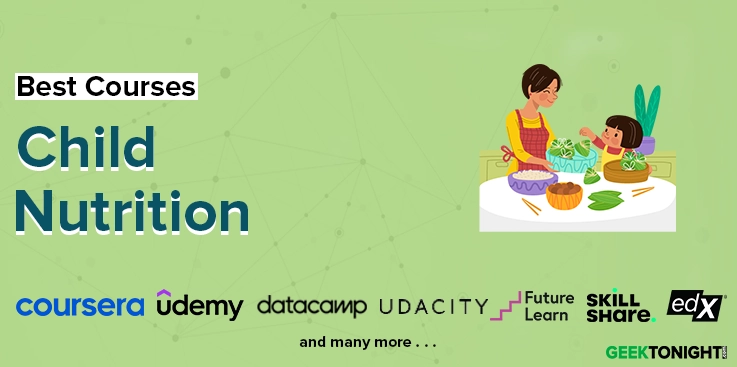Child nutrition involves making sure that children eat healthy food essential for their physical and mental development and also that prevents obesity and diseases. Proper knowledge of nutrition is important for a child to stay healthy and strong.
According to cdc.gov, “Empty calories from added sugars and solid fats contribute to 40% of daily calories for children and adolescents age 2–18 years—affecting the overall quality of their diets.” Thus it becomes absolutely crucial to study nutrition in children to help your own and even others by taking it up as a career option if it interests you greatly.

Table of Content
- 1 Best Child Nutrition Courses, Certification, Tutorials, Training, Classes Online
- 1.1 Child Nutrition and Cooking Course by Stanford University [Coursera]
- 1.2 Food for Kids: Discovering Healthy Eating [edX]
- 1.3 Stanford Introduction to Food and Health [Coursera]
- 1.4 Infant Nutrition: from Breastfeeding to Baby’s First Solids [FutureLearn]
- 1.5 Free Child Nutrition and Cooking Course [Stanford School of Medicine, Stanford University]
- 1.6 Child Nutrition Courses [FSSA Council]
- 2 FAQ
Best Child Nutrition Courses, Certification, Tutorials, Training, Classes Online
Child Nutrition and Cooking Course by Stanford University [Coursera]
This Coursera child nutrition course focuses on contemporary child nutrition and the effect of the individual decisions made by each family. The health risks associated with obesity in childhood are also discussed along with which participants will learn what constitutes a healthy diet for children and adults and how to prepare simple, delicious foods at home.
Maya Adam who has been teaching at Stanford University since 2009 is the instructor of this Coursera online child nutrition class. She pursued her medical degree at the University of British Columbia in Canada and later received her BA in Human Biology at Stanford. The Leland Stanford Junior University is an American private research university on an 8,180-acre campus near Palo Alto, California, United States.
Key Highlights & USPs
- Find answers to questions like: Why are so many foods processed, and how can we protect our families? Also, check out the six primary ingredients every cook should have handy.
- Includes everything you need to know about what is and what makes up a balanced meal, comprising fats, carbohydrates, and proteins. Master tricks for controlling portion sizes without compromising on satisfaction.
- Tips for navigating the supermarket and shopping for vegetables. Know why the family meal is about more than just food; how to pack a quick, healthy lunch for a child and why this is so important; how to shop for fruits and vegetables; making over our children’s favourite foods, and more healthy treats.
- Understand how to make choices that are good for you and the planet. Learn the difference between local, organic, and sustainable. Consider gardening as a way of making children aware and instilling excitement about fresh foods.
- Examine what have we learned about achieving good eating habits based on enjoyment of the right foods, tips on working with food allergies, reading nutrition labels, and understanding the elements of taste.
- Recipes included in the course are a simple stew, a simple homemade salad dressing along with a Sunday morning treat that is perfect for the whole family. Get access to 11 hours of 100% online beginner-level learning with flexible deadlines and a shareable certificate at the end.
Who is it for?
This Coursera child nutrition certification is designed to aid and assist participants to be the superior health providers, teachers and parents of the present and future times.
Rating: 4.8/5
Students Enrolled: 469,248
Duration: 11 hours
Food for Kids: Discovering Healthy Eating [edX]
Learn about the science of food, nutrition and digestion using a fun approach with this edX child nutrition course. Investigate how the food you eat contributes to your health and well-being, what is healthy eating, where food comes from and what is sustainable eating. This class will help answer these questions and more.
Claire E. Collins, Laureate Professor in Nutrition and Dietetics and Tracy Burrows, Professor in Nutrition and Dietetics from the University of Newcastle are both the instructors of this edX child nutrition tutorial.
Key Highlights & USPs
- Study what is present in food, how your body utilises food to develop and be active, and how much of it you actually need to stay healthy.
- Use interesting examples from science to investigate tastes and flavours, and understand how food is digested along with growing and cooking food.
- The course will go over and teach you how to check health information, help you create healthy eating plans and finally contribute to a healthy planet.
- Understand what is in food and how it is digested in the body, the healthy eating guidelines and how to identify healthy food and drink choices.
- Study food advertising and marketing, and how to create health messages. Learn how healthy eating habits contribute to your well-being and about reducing food waste and being part of a healthy community.
Who is it for?
This edX child nutrition class is suitable for children who can read (ages 6+). It is mainly targeted at primary school children, but any child or adult can complete this course.
Rating: 4.7/5
Students Enrolled: 24,682
Duration: 3 weeks, 2-3 hours/week
Stanford Introduction to Food and Health [Coursera]
To address diet-related diseases, this Coursera child nutrition class explores innovative strategies for promoting healthful eating. The curriculum contains information and practical skills that you need to begin with for enhancing the diet. It will take you from reductionist discussions about nutrients and, towards practical discussions about real food and the environment in which we consume it.
Maya Adam who has been teaching at Stanford University since 2009 is the instructor of this Coursera online child nutrition class. She pursued her medical degree at the University of British Columbia in Canada and later received her BA in Human Biology at Stanford. The Leland Stanford Junior University is an American private research university on an 8,180-acre campus near Palo Alto, California, United States.
Key Highlights & USPs
- Examine the social and cultural shifts that have contributed to modern epidemics of overweight and obesity. Review the nutrients found in foods, their different functions in the human body and how we can support our own health by choosing wisely from the foods within each category.
- Explore the differences between processed and real whole food along with the halrmful implications of food processing on our health.. Also, look at how the consumption of sugar has changed in recent decades and explore sensible solutions for people who wish to start eating better.
- Focus on sustainable solutions to the challenge of choosing healthier foods more frequently. Begin prospecting the practical tips for food preparation that are meant to be enjoyed and health supporting.
- Get additional practical tips for grocery shopping, reading labels and putting together a balanced meal. Learn about the most important secret ingredient leading you to success in moderation.
- List of recommended books, instructional cooking clips and videos that can help deepen your understanding of the course material. Explore the recommendations on this list to learn more about food, health, eating behaviours, and more.
- Get access to 7 hours of 100% online beginner-level learning with flexible deadlines, and a shareable certificate.
Who is it for?
By the end of this Coursera child nutrition course, students should have the tools they need to distinguish between foods that will support their health and those that threaten it. In addition, the module presents a compelling rationale for a return to simple home cooking, an integral part of efforts to live longer, healthier lives.
Rating: 4.7/5
Students Enrolled: 776,043
Duration: 7 hours
Infant Nutrition: from Breastfeeding to Baby’s First Solids [FutureLearn]
With this FutureLearn child, nutrition certification learns what is good infant nutrition, how and what to feed a baby, and how to commence weaning. Explore the principles of good nutrition in the first 12 months of a baby’s life and trace the milestones in a baby’s first year of life to learn about the principles of great nutrition in kids and their application.
Karen Campbell, a Professor at the Institute for Physical Activity and Nutrition at Deakin University has covered this FutureLearn child nutrition course. Karen works on making maternal and child health better by optimising nutrition. Deakin University is one of Australia’s largest and most prestigious universities with thousands of students online and offline.
Key Highlights & USPs
- Prospect the nutritive and dietary requirements in young children and the importance of healthy food for babies.
- Dive into detail about the benefits of breastfeeding and why its formula can be of great use.
- Provides an opportunity to get and acquaint yourself with some global infant nutrition guidelines and best practices.
- Understanding why an infant feeding schedule is crucial. Learn why the step of babies moving from milk to mushy stuff is extremely important.
- Understanding the principles behind infant feeding guidelines, also know about what types of foods are healthy and nutritious for infants.
- Get access to 3 hours per week of introductory level learning for 2 weeks, with a digital certificate when eligible.
Who is it for?
This FutureLearn child nutrition class has been specially curated for new parents of infants including healthcare workers that have an interest in studying early childhood nutrition. By the end of the course, learners will be able to identify the key principles of good infant nutrition, explain the importance of breastfeeding and what role infant formula may play and describe methods for introducing solid foods into the diet of infants
Rating: 4.7/5
Students Enrolled: 24,682
Duration: 3 months, 12 hours/week
Free Child Nutrition and Cooking Course [Stanford School of Medicine, Stanford University]
This Free Child Nutrition and Cooking Course examine contemporary child nutrition in America from the opinions of individuals made by each family to the widespread food marketing targeting our children with the health hazards associated with obesity in their early years. Learners will grasp what constitutes a healthy diet for children and even grown-ups and how to prepare simple yet deliciously filling foods at home.
Maya Adam, MD, Lecturer, Stanford School of Medicine is the instructor of thisFree Child Nutrition and Cooking Course by Stanford.
Key Highlights & USPs
- The childhood obesity epidemic facing the USA in particular and other advanced nations who are following suit. Study what can be done and what are the recommendations presently, the changes that have occurred over time while examining how well we are doing in meeting our children’s dietary needs.
- Find answers to questions like What constitutes a balanced meal and what are carbohydrates, fats and proteins. Know how to choose the healthiest option among them. Explore what is a glycemic index. Also, figure out tricks for controlling portion sizes and maintaining satisfaction simultaneously.
- Pack a quick and healthy lunch for a child and learn about its importance. Shop for fruits and vegetables. Sail through the supermarket exploring ingredients in detail for better health; Focus on the benefits of the family meal, how can we make over our children’s favourite foods, and help them enjoy healthier treats.
- Plant a kitchen garden of your own. This will not only help children realise the importance of healthy food but will also promote fresh consumption; learn the meaning of the terms like “organic” and “locally grown”. The course includes creative ideas for serving vegetables, involving children in the kitchen and some classic techniques for making soups and cooking fish.
- Learn about environmental challenges and hazards like advertising and readily available processed foods. Encourage the right food choices despite such issues. Make choices that benefit our and the planet’s health.
Who is it for?
This Stanford University child nutrition certification will help prepare students to be participants to be the superior health providers, teachers and parents of the present and future times. This course would be ideal for a wide variety of students especially those who are interested in promoting and protecting health and enjoyment throughout their lives including the lives of the children they care for.
Rating: 4.7/5
Students Enrolled: 24,682
Duration: 3 months, 12 hours/week
Child Nutrition Courses [FSSA Council]
This FSSA Council child nutrition course is a great option for parents and those who are willing to make a career out of child nutrition consulting. This will not only help you grasp the beginning years of nutrition but will also help in incorporating healthy eating habits and diets. All this is possible because the class provides a strong conceptual ground on what nutrition actually is.
FSSA council has curated this child nutrition certification with their philosophy of “Dream, Believe, Achieve.” They have a mission of providing the highest quality education in domains like fitness and sports sciences.
Key Highlights & USPs
- Dive into detail and differences between macronutrients and micronutrients, the various classifications of nutrition, its significance in the daily diet and the several roles it plays in building a child’s health.
- Study the nutritional requirements of babies and children of all ages. Also, explore the extremely crucial topic of different macronutrients and micronutrients that are particularly important for different age groups and the sources of food for each of them.
- Another pertinent and important topic included in the curriculum is food allergies and other food-related issues in children. It covers what a food allergy is, its causes, and the difference between a food allergy and food sensitivity or intolerance. The next step of recognising such allergies and dealing with them is also shown here.
- Study this self-paced program that is designed in a manner for you to be able to finish in 100 – 120 hours.
Who is it for?
This FSSA Council child nutrition class is for parents and professionals that are willing to dive deeper into the concepts of child nutrition and make a career out of it.
Rating: 4.7/5
Students Enrolled: 24,682
Duration: 3 months, 12 hours/week
FAQ
What are the nutritional needs of a child?
Ans: Young children must be provided with protein and iron-rich food to grow and develop. Such food items include beans, pulses, fish, eggs, pulses, meat, etc. Apart from this a completely balanced diet comprising of necessary vitamins, minerals, carbohydrates, fibres, etc. is suggested.
What are the three main nutrients of concern for children?
Ans: There are many ways to teach kids about nutrition and encourage healthy habits. Some of them are, starting young, focusing on the overall diet, being a role model, not being rigid or forcing eating, setting snack boundaries, educating them on what their body needs, etc.










